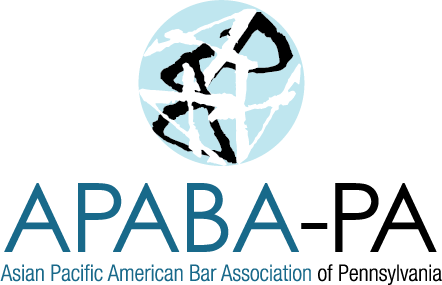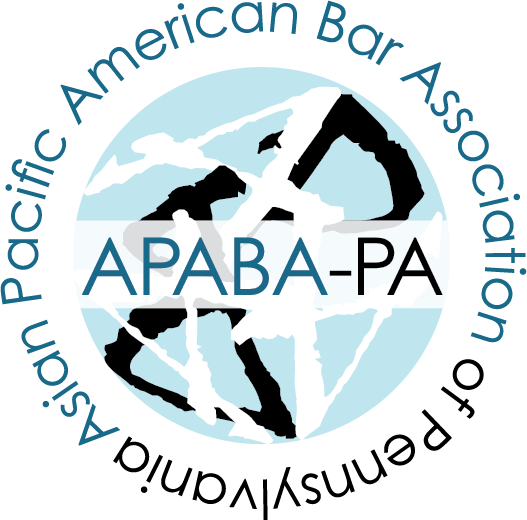Resolution in Support of Right to Reproductive Healthcare
WHEREAS, the Asian Pacific American Bar Association of Pennsylvania (APABA-PA) is committed to protecting the civil and constitutional rights of Asian Pacific American (APA) communities and other underrepresented and minoritized communities;
WHEREAS, APABA-PA values equality, community, advocacy, relationships, diversity, equity, inclusion, open-mindedness, safety, and the health and wellbeing of our members and APA communities as a whole;
WHEREAS, women*1 have a constitutional right to be treated equally under the law, and the Supreme Court of the United States has previously recognized a constitutional right to an abortion in Roe v. Wade, 410 U.S. 113 (1973);
WHEREAS, Roe v. Wade and almost fifty years of legal precedent recognizing a constitutional right to an abortion have been recently overturned by Dobbs v. Jackson Women’s Health Organization, 597 U. S. ____ (2022), with the dissenting opinion of U.S. Supreme Court Justices Breyer, Sotomayor, and Kagan stating “Whatever the exact scope of the coming laws, one result of today’s decision is certain: the curtailment of women’s rights, and of their status as free and equal citizens;”*2
WHEREAS, laws that have the purpose or effect of restricting or burdening access to abortion services disproportionately affect women of lower socioeconomic status, including APA women and women of other minoritized communities, in the United States, and are likely to result in worsening health disparities;*3
WHEREAS, some APA communities already experience significant barriers to accessing needed healthcare, including financial, physical, language and cultural barriers,*4 and laws restricting abortion access will add to these barriers and result not in a reduction in the number of abortions but rather an increase in the proportion of unsafe abortions, associated medical complications, and maternal deaths;*5
WHEREAS, APA women experience significant barriers to economic success,*6 and research has demonstrated that access to abortion services leads to increases in women’s education, labor force participation, occupational prestige, and earnings;*7
WHEREAS, some APA communities experience higher poverty rates and lower levels of education than U.S. averages,*8 and research has demonstrated that abortion access has a causal link to improved long-run outcomes of entire generations of children by increasing the likelihood of achieving higher levels of education and reducing the likelihood of experiencing poverty and enrolling in public assistance;*9
WHEREAS, laws that seek to criminalize the termination of any stage of pregnancy have resulted in APA women being prosecuted for their pregnancy outcomes, in part due to stereotypes about Asians,*10
WHEREAS, survey data demonstrates widespread support for reproductive health rights among APA communities, with 74 percent of APA respondents in favor of keeping Roe v. Wade, as opposed to overturning it and 67 percent in favor of a federal law protecting a woman’s legal right to abortion by preventing restrictions that make it more expensive and difficult to access safe abortions;*11
WHEREAS, legal scholars have expressed concern that the overturning of Roe v. Wade and the loss of a constitutional right to abortion could result in the subsequent elimination of other legally recognized rights that are important to the protection, health and wellbeing of APA communities, such as the right to contraception, same-sex marriage, and interracial marriage;*12
WHEREAS, Pennsylvania law already places restrictions on the ability to access abortion services, including a sex-selective abortion ban*13 that has been demonstrated to have no impact on sex ratios at birth of APA children,*14 and instead places unnecessary burdens on healthcare providers to question each person’s reasons for seeking an abortion and potentially leading to the stigmatization of APA women and communities in particular;*15
WHEREAS, attempts have been made by state governments, including Pennsylvania, to introduce legislation that has the purpose or effect of eliminating or further restricting the right to access abortion services, such as Pennsylvania Senate Bill 956;*16
WHEREAS, the American Bar Association (ABA) has adopted several positions (i) supporting the right of a woman to choose to terminate a pregnancy before fetal viability; or thereafter, if such termination is necessary to protect the life or health of the woman;*17 (ii) urging governments to refrain from adopting requirements that are not medically necessary or that have the purpose or effect of restricting availability or burdening access to healthcare services,*18 and (iii) opposing the criminal prosecution of any person for having an abortion, or for experiencing a miscarriage, stillbirth, or other pregnancy outcome and urging federal, state, local, tribal and territorial governments to repeal and oppose statutes that would allow such criminal prosecution,*19
WHEREAS, the National Asian Pacific American Bar Association (NAPABA) has also recently adopted a position (i) recognizing the right of women to access reproductive healthcare, and the constitutional right of women to terminate their pregnancy before fetal viability; or thereafter, if such termination is necessary to protect the life or health of the woman; (ii) urging governments to support the constitutional right of women to access reproductive healthcare and refrain from adopting requirements that are not medically necessary and burden the ability of patients to access healthcare services; and (iii) opposing the criminal prosecution of any person for having an abortion, or for experiencing a miscarriage, stillbirth, or other pregnancy outcome, and urging governments to repeal or clarify laws so they may not be used to prosecute women for their pregnancy outcomes;*20
NOW, THEREFORE, BE IT RESOLVED, that the Asian Pacific American Bar Association of Pennsylvania:
- Recognizes the right of women to access reproductive healthcare, including the right of women to terminate their pregnancy (i) before fetal viability; or (ii) thereafter, if such termination is necessary to protect the life or health of the woman;
- Urges federal, state, local, and tribal governments to support the right of women to access reproductive healthcare, and to refrain from adopting requirements that are not medically necessary and burden the ability of patients to access healthcare services;
- Opposes the criminal prosecution of any child-bearing person for having an abortion, or for experiencing a miscarriage, stillbirth, or other pregnancy outcome, and urges governments to repeal or clarify laws so they may not be used to prosecute women for their pregnancy outcomes;
- Opposes any actions taken or attempts made by federal, state, local, and tribal governments that have the purpose or effect of eliminating or restricting any existing civil, constitutional, or other legally-recognized rights, which benefit or protect APA communities; and,
- Authorizes the President of APABA-PA or the President’s designee to communicate the content of this Resolution to its members, other bar associations, elected and public officials, and the public at large, and to take such other action as may be appropriate.
- Transgender and non-binary child-bearing individuals may also rely on abortion services, and such individuals also may be harmed or prejudiced to the same extent as APA women. Therefore, while the term “women” is used here, it is meant to encompass all individuals who use reproductive services.
- Dobbs v. Jackson Women’s Health Organization, 597 U. S. ____ (2022), available at: https://www.supremecourt.gov/opinions/21pdf/19-1392_6j37.pdf.
- Dehlendorf C, Harris LH, Weitz TA, Disparities in Abortion Rates: A Public Health Approach, Am J Public Health. 2013 October; 103(10): 1772–1779, available at https://www.ncbi.nlm.nih.gov/pmc/articles/PMC3780732/.
- Lee S, Martinez G, Ma GX, Hsu CE, Robinson ES, Bawa J, Juon HS. Barriers to health care access in 13 Asian American communities. Am J Health Behav. 2010 Jan-Feb;34(1):21-30, available at: https://www.ncbi.nlm.nih.gov/pmc/articles/PMC6628721/.
- World Health Organization, “Abortion” (November 25, 2021), available at: https://www.who.int/news-room/fact-sheets/detail/abortion.
- Li, Peggy, Recent Developments Hitting the Ceiling: An Examination of Barriers to Success for Asian American Women, 29 Berkeley J. Gender L. & Just. 2014, available at: https://ssrn.com/abstract=2318802 or http://dx.doi.org/10.2139/ssrn.2318802.
- Caitlin Knowles Myers and Morgan Welch, “What can economic research tell us about the effect of abortion access on women’s lives?” (November 30, 2021), available at https://www.brookings.edu/research/what-can-economic-research-tell-us-about-the-effect-of-abortion-access-on-womens-lives/.
- Abby Budiman and Neil G. Ruiz, “Key facts about Asian origin groups in the U.S.” (APRIL 29, 2021), available at: https://www.pewresearch.org/fact-tank/2021/04/29/key-facts-about-asian-origin-groups-in-the-u-s/.
- Myers and Welch, supra note 6.
- Miriam Yeung, How Asian American women became the target of anti-abortion activism, THE WASHINGTON POST (November 4, 2015), available at: https://www.washingtonpost.com/posteverything/wp/2015/11/04/how-asian-american-women-became-the-target-of-anti-abortion-activism/.
- Center for Reproductive Rights, “Women’s Health Protection Act & Abortion Attitudes Research Findings” (July 2017), available at: https://reproductiverights.org/sites/default/files/documents/Revised-WHPA-Report-Center-for-Reproductive-Rights-072817.pdf.
- Robert, A., Legal experts fear loss of abortion right could usher in end of same-sex marriage, other rights, ABA Journal (4 May 2022), available at: https://www.abajournal.com/web/article/legal-experts-fear-loss-of-abortion-right-could-usher-in-end-of-same-sex-marriage-other-rights.
- Abortion Control Act, 18 Pa.C.S.A. § 3201 et seq.
- Nandi A; Kalantry S; and Citro B, Sex-selective Abortion Bans are Not Associated with Changes in Sex Ratios at Birth among Asian Populations in Illinois and Pennsylvania (2014). Cornell Law Faculty Publications. 1312. Available at: https://scholarship.law.cornell.edu/facpub/1312.
- Guttmacher Institute, “Abortion Bans in Cases of Sex or Race Selection or Genetic Anomaly” (May 1, 2022), available at: https://www.guttmacher.org/state-policy/explore/abortion-bans-cases-sex-or-race-selection-or-genetic-anomaly.
- https://www.legis.state.pa.us/cfdocs/billInfo/BillInfo.cfm?syear=2021&sind=0&body=S&type=B&bn=956
- https://www.americanbar.org/content/dam/aba/directories/policy/annual-1992/1992_am_12.pdf
- https://www.americanbar.org/content/dam/aba/directories/policy/annual-2019/115f-annual-2019.pdf
- https://www.americanbar.org/content/dam/aba/directories/policy/midyear-2021/107a-midyear-2021.pdf
- https://cdn.ymaws.com/www.napaba.org/resource/resmgr/7_advocacy_&_research/policy_resolutions/2022.06_NAPABA_Stmt_on_Repro.pdf
Distribution Copy Here!
- On July 5, 2022

